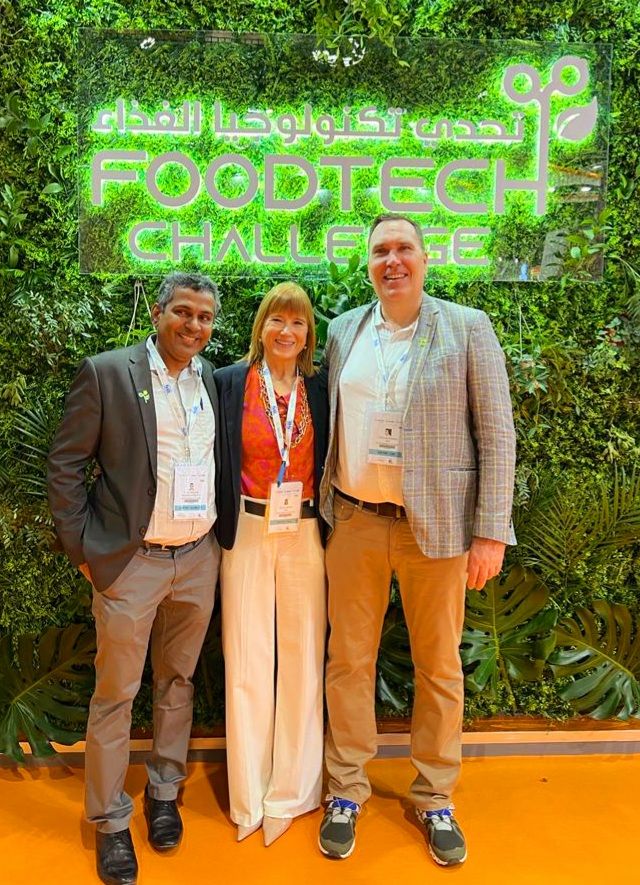Extreme weather conditions coupled with very little arable land make agricultural productivity difficult in many parts of the Middle East and North Africa (MENA). By some accounts, there is less than 5% of arable land in two-thirds of countries in the MENA region.
Sub-Saharan Africa, on the other hand, has abundant arable land but grapples with limited funding to boost its agriculture sector and the region’s overall productivity.
For both regions, water lentils hold new promise for both smallholder farmers and alternative protein sources, according to Switzerland-based agtech company Sustainable Planet.
Water lentils are fast-growing aquatic plants made up of roughly 40% protein and, what some say, is the most bioavailable source of vitamin B12 out there. The plant is also very high-yielding, making daily and year-round harvesting possible.
Sustainable Planet wants to bring this plant-based protein to arid areas with non-arable land, starting with the Middle East and Africa. To do this, the company contracts with smallholder farmers to grow and process the lentils it can then turn into all manner of products, from pastas to protein isolates for meat and egg substitutes.
So far, Sustainable Planet says it has run successful projects of growing water lentils across multiple countries. It has established partnerships with the University of Qatar and has set up projects in Oman, India, Dubai and Abu Dhabi with the help of the Abu Dhabi Investment Office, where more research on various species and best production setups is being conducted.
Sustainable Planet’s biggest project, however, lies in Mozambique, where the startup is teaming up with a fish farmer to grow water lentils in fish ponds, which are subsequently used for fish feed.
Water lentil cultivation is not new. It has taken off in regions like the US and Canada with startups like Parabel (which has since shut down) and Pontus Water Lentils, albeit in a more industrial way of production as opposed to Sustainable Planet’s model of working with smallholders.
“Our driver is to make a big impact that is scalable in a broad way because we think the current [food production] model does not function properly and even lags in Africa,” Susan Payne, COO at Sustainable Planet tells AFN. “Our group is focused in two regions: one [MENA] where there is plenty of non-arable land and a lot of funding, and another [Africa] where there’s very little funding for agri and plenty of arable land. To have this very appealing, high returning, scalable impact, growth opportunity is really unique.”
A need to move beyond soya
These regions also illuminate the need for fast-growing and high-yielding protein sources, particularly as population growth is expected to hit 10 billion by 2050.
“We need 50% to 70% more protein in coming decades,” says Sven Kaufmann, CEO at Sustainable Planet. “We cannot solve this problem with soybean, so we need to find alternative proteins and water lentils can be one solution.”
According to Payne, the Middle East and Africa are two regions where protein demand desperately needs to increase and the startup has the feedback to support this claim.
Payne says Sustainable Planet could easily export its water lentils grown in the Middle East and Africa. “But frankly, the demand [for protein] in Africa is so huge locally that we could sell all of [the product]. We are fielding calls now in Africa that are unsolicited and are of magnitudes that are so big, that we could sell everything that we produce in Africa.”
Further to Sustainable Planet’s mission is finding an alternative to soya, one of the most common plant-based protein sources, owing to its high protein content and applicability in developing various food types. Even so, there has been quite some noise around soy production and its direct correlation to deforestation.
The World Wildlife Fund cites that there has been an uptick in soybean production in tropical countries like Brazil, Argentina, Bolivia and Paraguay. Forests have unfortunately had to be cleared, to give room for soybean cultivation. So big is the problem, that smallholders have been displaced to pave way for soybean cultivation, in some cases.
Global foodtech award and its impact
Sustainable Planet was among four winners at the Global Foodtech Awards held in Abu Dhabi, UAE selected out of a pool of 667 startups from close to 80 countries. Payne admits the win came with a lot of recognition from important and impactful strategic partners.

L to R: Kiran Dominic (Chief Agronomist), Susan Payne (COO) and Sven Kaufmann (CEO)
“Getting to the final 12 was a very humbling experience honestly because the other finalists were so innovative, in a really cool group of people doing exactly what we want, which is to innovate and to make a huge impact on the planet when it comes to food,” says Payne.
“I’ve been doing food projects in Africa for 12 years and never came across anything that is this powerful across many different points. It literally strikes multiple boxes. That is why we won the award. Because it sits across three things. Food security, regenerative agriculture and climate change.”
Producing animal feed protein is a viable route now for Sustainable Protein to kickstart revenue generation, according to Kaufmann. The segment is also seeing its share of surging demand and could hit a valuation of $420 billion by 2032. The startup is however keen on launching products for human consumption in future.
“Our solution is the solution. The solution to the use of non-arable land to produce food. There aren’t a whole lot of different solutions. There’s potentially aquaculture and there is Sustainable Planet growing a protein source and having this protein source is extremely important because non-arable land is such a problem otherwise,” Payne says.





